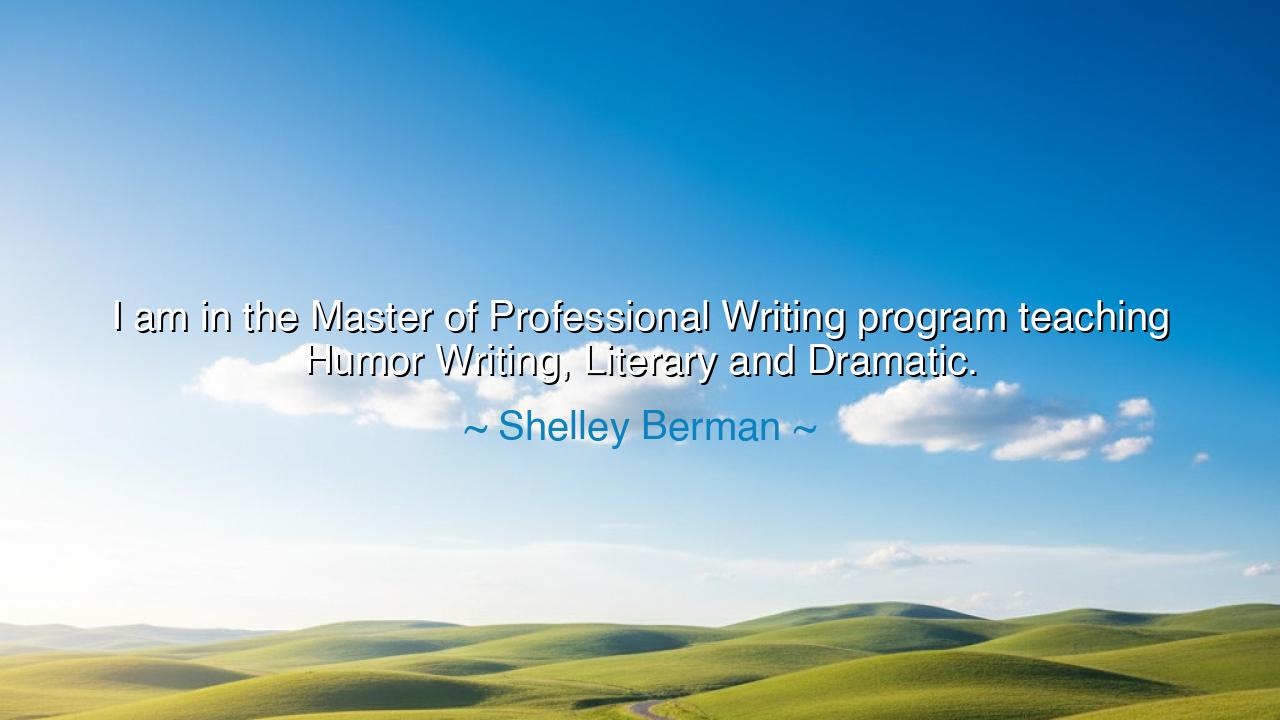
I am in the Master of Professional Writing program teaching Humor
I am in the Master of Professional Writing program teaching Humor Writing, Literary and Dramatic.






The great comedian and philosopher of performance, Shelley Berman, once said: “I am in the Master of Professional Writing program teaching Humor Writing, Literary and Dramatic.” To some, this may sound like a simple statement of vocation — the words of a teacher describing his craft. Yet within it lies a profound meditation on the nature of art, wisdom, and the transmission of laughter. Berman, one of the early pioneers of observational comedy, understood that humor is not mere entertainment; it is literature of the soul, drama written in laughter. His quote speaks not only of a profession, but of a lineage — the eternal passing of creative fire from master to student, from heart to heart.
To teach Humor Writing is to teach the art of revelation. It is to help others uncover the sacred paradox of comedy — that laughter is often born from pain, that mirth often grows in the soil of sorrow. Berman, who began his career in the turbulent world of stand-up, knew that humor is not a mask to hide emotion, but a lens through which to transform it. In declaring his role as both writer and teacher, he stood as a bridge between two worlds: the world of performance, where laughter erupts like thunder, and the world of the written word, where it glows like quiet fire. To teach both literary and dramatic humor is to guide others toward balance — to show them how wit and empathy, timing and truth, can coexist in harmony.
The ancients, too, understood that teaching was not the mere transfer of skill, but the awakening of understanding. Consider the philosopher Aristotle, who once taught that comedy is imitation not of the noble, but of the human — that through humor, we learn humility and self-knowledge. Like Aristotle before him, Berman recognized that laughter reveals what solemnity conceals. In his classroom, he was not merely training writers, but shaping storytellers who could heal through joy. For the pen that can write both sorrow and laughter holds within it the entire range of the human heart.
Berman’s quote also carries a subtle reverence for craftsmanship. The phrase “Master of Professional Writing” is no boast, but a reminder that art must be disciplined, guided, and refined. The ancients would call this techne — the sacred practice of creation. Just as a sculptor must know marble, or a musician must know harmony, so must the humorist know rhythm, silence, and truth. Comedy, when crafted with intelligence, becomes not trivial but transcendent. It is the laughter that does not fade, the wit that reflects life’s contradictions with grace. In this, Berman teaches us that to be a master of humor is to be a master of humanity.
There is a story from ancient Athens of a playwright named Menander, whose comedies were said to bring both laughter and tears. One evening, after watching one of his plays, a philosopher exclaimed, “This man writes not of fools, but of men.” So it was with Berman, whose teaching of “Humor Writing, Literary and Dramatic” was not about jokes alone, but about character, truth, and the fragile comedy of existence. His humor — and the humor he taught — was rooted in empathy. He taught that to write laughter well, one must first learn compassion. For true comedy does not mock; it enlightens.
Thus, the lesson of Berman’s words is timeless: laughter is a sacred art, and to create it is to serve humanity. Those who seek to write or perform humor must do so with sincerity, not cynicism. They must study the soul as much as the craft, for every line of comedy carries the weight of emotion beneath its surface. To laugh is to breathe again; to make others laugh is to give them breath when they have forgotten how. This is the teacher’s calling — not merely to instruct, but to restore the spirit through art.
So, let these words echo in the hearts of those who create and those who teach: the writer of humor is also a healer, and the teacher of that writer is a guardian of joy. Follow the example of Shelley Berman — blend the literary with the dramatic, intellect with playfulness, wisdom with laughter. For laughter, when born from truth, is a divine sound. It bridges sorrow and joy, despair and hope. To teach that, as Berman did, is not to teach mere words — it is to pass on the eternal flame of understanding, resilience, and love.






AAdministratorAdministrator
Welcome, honored guests. Please leave a comment, we will respond soon